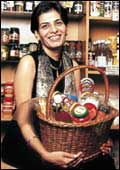|
Is
there a connection between the health of a CEO and the behaviour
of his company's scrip in the stockmarket? Dhirubhai Ambani suffered
a stroke on the evening of June 24. By the middle of the next day,
the Reliance Industries had fallen from the previous day's Rs 284
to Rs 268. This despite the fact that the elder Ambani had groomed
his sons to run his empire. And seven years earlier, when Aditya
Vikram Birla died (October 1, 1995), the Grasim scrip closed on
September 29, at Rs 592 and opened on October 4 at Rs 562. In Gita
Piramal's Business Maharajahs Birla's wife Rajashree Birla defends
the family's decision by saying, ''He (Aditya Birla) didn't want
people to talk about it to him or be sympathetic about it, that
was the only reason.'' Fair reason, no doubt; only, CEO's of listed
companies have a responsibility to their investors. Simply put,
they have a right to know. In the US, this has been institutionalised
by SEC (Securities & Exchange Commission). India does not have
any such rules. But it soon could.
Says Pratip Kar, Executive Director, Securities
and Exchange Board of India: "There are no existing stipulation
making it mandatory for a company to make disclosures on the health
of the CEO or senior board menbers. But the corporate governance
committee had received a suggestion that it should. The commitee
will be considering this, which will go a long way in strengthening
existing material disclosure norms and prevent rumours from wreaking
havoc in the market.'' Tata Sons Chairman Ratan Tata is all for
such a move. "I believe such a rule is appropriate if implemented
properly. It should not constitute an intrusion on the privacy of
the individual."
-Abir Pal
DYING YOUNG
Given India's personality-driven family-business
culture the death of a CEO could be catastrophic.
 G.C.
Burman, 60 G.C.
Burman, 60
One day in 2001, he got off the treadmill, and suffered a fatal
heart attack. He was to taken over as Dabur's chairman the same
year from V.C. Burman. G.C. was widely perceived to be the man driving
the professionalisation of a family business.
 Parvinder
Singh, 56 Parvinder
Singh, 56
Ranbaxy's founder CEO had been battling cancer for some time when
he died in 1999, setting off a mini-succession battle. This, despite
the man having done enough to ensure a smooth handover to his chosen
successor D.S. Brar.
 Aditya
Vikram Birla, 52 Aditya
Vikram Birla, 52
Birla's death (in 1995) from prostate cancer, was untimely and sudden.
Son Kumaramangalam Birla was yet to prove himself and it took him
several years to put the group he inherited in order, although he
did manage to do so smoothly.
 Dewang
Mehta, 39 Dewang
Mehta, 39
Fine he wasn't a CEO, but the death of Indian IT's most powerful
lobbyist, of unkown causes in a hotel room in Sydney threw the entire
industry into a quandary. While successor Kiran Karnik has done
enough, Nasscom (the National Association of Software and Service
Companies) will never be the same again.
 Rohinton
Aga, 61 Rohinton
Aga, 61
The Thermax CEO dies of a heart attack in 1996. The usual succession
issues raised their ugly head until wife Anu Aga took over. The
company took some time to stabilise after his death.
 Ravi
Gupta, 59 Ravi
Gupta, 59
In 1997, when Trikaya Grey's Ravi Gupta died (of stomach cancer),
there was widespread speculation that the agency would shut shop.
It took two years for the agency to recover from the blow.
 Ravi
Mammen, 39 Ravi
Mammen, 39
The man considered the brain behind MRF's aggressive marketing strategy
died of a heart attack in 1990. The company has gone from success
to success, but Chairman Mammen Mappillai and Vice Chairman Vinu
Mammen could have done with some help.
 Raman
Munjal, 42 Raman
Munjal, 42
The first managing director of Hero Honda died unexpectedly of a
heart attack in 1991. The Munjals had enough managerial bandwidth
to cope with the loss but it still hurt professionally.
-Seema Shukla
IT'S WHAT YOU EAT THAT
COUNTS
Food helps. At least, the right kind of it does,
says nutritionist Ishi Khosla
 |
| Ishi Khosla: Set short-term food goals |
It's
quite easy for Chief Executives
to keep themselves fit. All they need to do-to cope with occupational
hazards such as stress, 16-hour days, 20 days of traveling a month-is
keep an eye on what they eat.
First off, pack a brown-bag lunch from home
if you aren't traveling or do not have a luncheon meeting. Do the
smart thing and have a light meal before hitting that late-evening
party. Stress and long workdays sap you of vital nutrients. Keep
an eye on these killer-inputs.
B vitamins: These increase energy levels and
help keep your nerves healthy. Can be found in green veggies, potatoes,
fresh fruit, wheat germ, whole grain cereals, eggs, dairy products,
yeast, seafood, lean meats, liver, poultry, pulses, nuts, and dried
fruit.
Vitamin C: This increases the body's immunity
to common ailments (it won't do to fall ill once a month) and helps
heal wounds faster. Found in fresh fruits (especially the citrus
ones), fruit juices, and fresh vegetables
Zinc: Another immunity builder (a low-profile
one), Zinc is found in liver and red meats, egg yolk, dairy products,
whole grain cereals and seafood-especially oysters and shellfish
Complex carbohydrates: These boost energy levels
and calm the CEO mind (actually they'll calm any mind). Pasta, potatoes,
oats, pulses, bread and rice are a good source. These apart, follow
those old-fashioned rules about starting the day with a healthy
breakfast, not drinking too much of tea or coffee, and avoiding
snacks between mealtimes. Remember, unlike your day-job, think short-term
when it comes your food-goals. Avoid long-term food strategies.
And avoid stretch diet goals.
as told to Abha Bakaya
For more dietary inputs for CEOs and wannabe
CEOs log on to www.business-today.com
1
2
|

